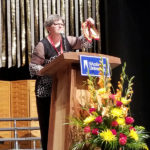God gave humankind dominion, not domination, over all of creation. Bishop Bob Gruss made that noteworthy distinction during a diocesan Stewardship Day earlier this month in Iowa City. God has entrusted us with care of the earth, a complex planet that cannot thrive with a one-size-fits-all mentality of stewardship. How we approach our responsibilities, our dominion over creation, merits attention as we celebrate Earth Day on April 22.
The first Earth Day, observed 46 years ago, sought to raise consciousness about the impact of air and water pollution. Rallies were held nationwide. Growing awareness of the consequences of fouling our own nest (remember the terrifying photos of the Cuyahoga River in Cleveland, Ohio, on fire?), led to creation of the U.S. Environmental Protection Agency (EPA) and passage of the Clean Air, Clean Water and Endangered Species Acts.
Many of our riverfronts, once obscured by factories that used and abused the water, have been transformed into community jewels with expansive vistas, recreation trails and the return of bald eagles. The EPA’s Brownfield Program, inaugurated in 1995, helped make some of this transformation possible through grants that enabled communities to clean up harmed land and repurpose it. The Iowa River Landing Revitalization Project in Iowa City is a beautiful example of such a conversion. River Action Inc., a Quad-City based grassroots organization, led the effort to revitalize the Mississippi Riverfront locally.
But the threat to our “common home,” as Pope Francis identifies the earth, requires accelerated attention. Examples are sadly plentiful: Flint, Mich., where people’s lives have been endangered because of lead in the water; the drought-stricken West Coast that caused water rationing; flooding on the East Coast and down South that destroyed lives, homes and businesses. Many of our fruit and vegetable crops, staples of our diet, are at risk because they depend on animals in order to pollinate. Some of those pollinators, in particular, honey bees, are in declining health. The causes are many and complex: pests, pathogens and viruses; poor nutrition (due to lack of foraging habitat); pesticide exposure and bee management practices; and lack of genetic diversity (www.epa.gov).
Iowa ranks first in corn production in the nation, but at a cost. To maximize yields and income, marginal ground may be taken out of pasture, resulting in corn being planted closer to ditches and streams. Fertilizers and herbicides applied to the crops are carried away with the rain, polluting streams and rivers. If a farmer chooses not to rotate crops, the soil is depleted of nitrogen. Farm practices are a sensitive subject. Sister Kathleen Storms, SSND, who directs Our Lady of the Prairie near Wheatland, recalls giving a talk to several parishes about “Laudato Si,” Pope Francis’ letter on care for our common home. One farmer questioned her science. The pastor pointed out that Sr. Storms was presenting important facts to enable Catholics to make decisions about being in better relationship with the earth. That’s an important point. Being in right relationship with creation is a teaching of the Catholic Church, and one that calls us to examine how we put that teaching into action in our own lives.
Some suggestions for starters:
• Buy local (some grocery stores/supermarkets advertise the distance their foods “travel” to get to the store). Eat seasonal produce (visit your library or the internet for some ideas). Eliminate the use of herbicides and chemical fertilizers in your gardens and on lawns.
• Establish pollinator strips or plants, such as milkweed, that attract pollinators.
• Visit the EPA website for best management practices to protect pollinators (http://tinyurl.com/jmwxuuo).
• Grow a garden and share your produce with those in need. Visit the Interfaith Power & Light website for organic, heirloom, non-GMO seed kits (http://tinyurl.com/h6kaz2s).
• Contact your Iowa legislators and urge them to support raising the sales tax by three-eighths of a penny to fund the Natural Resources and Outdoor Recreation Trust Fund. Iowa voters agreed to this measure in a 2010 referendum for investment in the state’s parks, recreation and clean water. The tax increase has yet to take effect.
• Contact your members of Congress to support the Green Climate Fund, an international fund to help poorer countries mitigate and adapt to climate change. The U.S. Conference of Catholic Bishops supports this fund.
• Take time to enjoy the gifts of creation, especially when we see so much destruction. What changes have you noticed since the first Earth Day? Teach children to be at home in this beauty.
• Finally, the 200-acre prairie retreat that Sr. Storms oversees has incorporated environmental practices that will be presented in a “Prairie Field Day” on June 17 from 10 a.m.-3 p.m. at Our Lady of the Prairie Retreat. The fee is $20. It’s a worthwhile investment to learn how to enhance and protect our common home, a God-given gift.
Barb Arland-Fye, Editor











